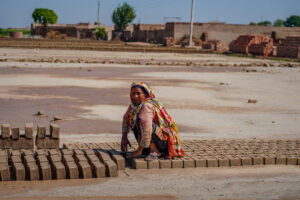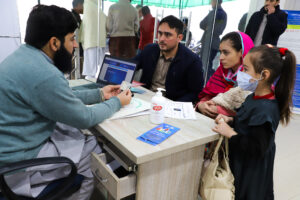The Global Gender Gap Index of 2022, compiled by the World Economic Forum, defines clearly that Pakistan stands at a meagre 142nd out of 146 on the gender equality index, with even lower ranks in terms of economic opportunities (145) and health (143). Efforts to sustain gender equality, set forth in the 1973 Constitution, are reflected in the strategic and ongoing inclusion of Pakistani women’s rights in political programming. The Vision 2025 document is the most recent example of this; in particular, the document proposes strengthening mechanisms for reporting and responding to cases of gender-based violence affecting vulnerable communities.
Adverse signs are also revealed from the data on education and food security, two areas of intervention that have the Italian Cooperation engaged. In 2010, literate women in Pakistan were only 41%, in 2019 the figure improved to 46.9%; however, only 24.6% of girls over 15 years of age participate in the formal workforce (as of 2022), of which 68% are largely in agriculture. Precisely the agricultural communities suffer from structural deficiencies and marginalizations to which the Italian Cooperation pays particular attention, with the objective of intervening on the alarming data related to food insecurity, which affects 42.4% of the population. At the same time, 36.7% of children under 5 suffer from malnutrition.
 In this context, the project “Promotion of decent work opportunities for the economic strengthening of vulnerable segments of society”, implemented by the International Labour Organization (ILO), has implemented social services for the families of brick kiln workers for the production of bricks, with particular attention to women, children and the families involved. The pilot model of initiating a one-window-operation, in two districts of Khyber-Pakhtunkhwa, has allowed women in the remotest of areas to acquire their most essential identity documents and to benefit from the social services offered by the province. Women were also informed about their legal protection and the importance of exercising the right to vote. In total, 328 women benefited from the initiative.
In this context, the project “Promotion of decent work opportunities for the economic strengthening of vulnerable segments of society”, implemented by the International Labour Organization (ILO), has implemented social services for the families of brick kiln workers for the production of bricks, with particular attention to women, children and the families involved. The pilot model of initiating a one-window-operation, in two districts of Khyber-Pakhtunkhwa, has allowed women in the remotest of areas to acquire their most essential identity documents and to benefit from the social services offered by the province. Women were also informed about their legal protection and the importance of exercising the right to vote. In total, 328 women benefited from the initiative.
 The Italian Cooperation is also contributing to the BISP – Benazir Income Support Program for social Protection, one of the 48 projects included in the PIDSA Debt Conversion Programme. This is focused in the vulnerable areas of Baluchistan province, where many communities live in conditions of severe malnutrition, especially pregnant women and children up to 3 years old. The health facilities set up thanks to the Italian contribution are recording an increase in women accessing breastfeeding services, requesting identity documents, childbirth preparation meetings and receiving materials on correct nutrition and food packages to supplement their diet. Men are also involved in the activities, with social mobilization actions aimed at involving both parents in the care of newborns. This is also useful for recognizing the importance of men’s role in the society and in promoting the empowerment of women.
The Italian Cooperation is also contributing to the BISP – Benazir Income Support Program for social Protection, one of the 48 projects included in the PIDSA Debt Conversion Programme. This is focused in the vulnerable areas of Baluchistan province, where many communities live in conditions of severe malnutrition, especially pregnant women and children up to 3 years old. The health facilities set up thanks to the Italian contribution are recording an increase in women accessing breastfeeding services, requesting identity documents, childbirth preparation meetings and receiving materials on correct nutrition and food packages to supplement their diet. Men are also involved in the activities, with social mobilization actions aimed at involving both parents in the care of newborns. This is also useful for recognizing the importance of men’s role in the society and in promoting the empowerment of women.
The project “Support for the female educational sector and the conservation of cultural heritage through education in Pakistan” focuses its attention on young students and teachers in the Provinces of Punjab and Khyber-Pakhtunkhwa, thanks to the partnership with UNESCO. In the educational component, training sessions on Activity-based Learning and Multigrade teaching techniques involved 440 teachers. These were conducted along with infrastructural interventions in 96 schools to improve spaces and the provision of services. In the cultural heritage component, a total of 114 educators (55 in Sindh, 47 in Khyber-Pakhtunkhwa and 12 in Punjab) benefited from training courses to learn about and convey the importance of cultural heritage to children of schools. As the testimony of Tehmina Khushk, a primary school teacher in Thatta, Sindh demonstrates:
 “We have always known the archaeological sites of our land but we have never really understood their importance until today. Thanks to the sessions provided by the project we now know that this is our heritage and that we must preserve it, we have understood how important awareness of what surrounds us matters“
“We have always known the archaeological sites of our land but we have never really understood their importance until today. Thanks to the sessions provided by the project we now know that this is our heritage and that we must preserve it, we have understood how important awareness of what surrounds us matters“
